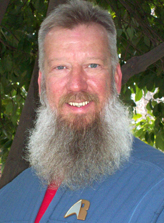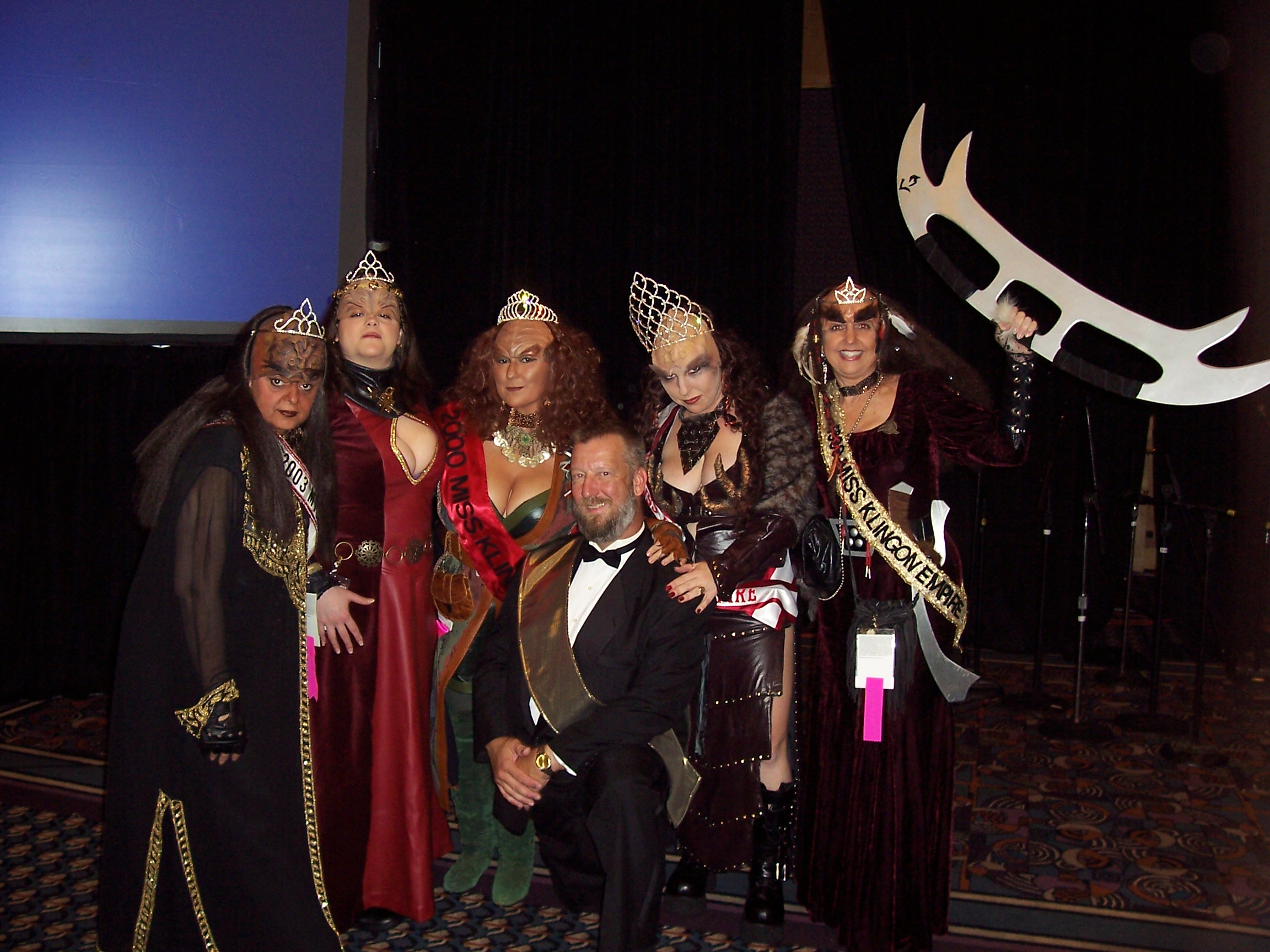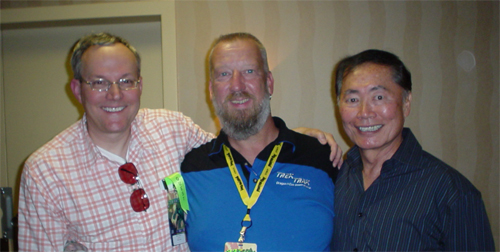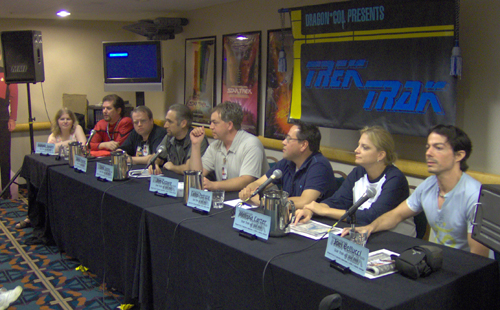An Interview with Eric L. Watts, Founder of TrekTrax Atlanta (Part 2)
 Below is part 2 of my interview with former Dragon*con Star Trek programming director and founder of TrekTrax Atlanta, Eric L. Watts. You can read part 1 here. In the interview he discusses what happened with Dragon*con, the news getting leaked, his fondest memories, the trials and tribulations of striking out on his own, and whether he plans to attend Dragon*con this year despite all that’s happened. This interview is pretty long, so I’ve divided it up into parts for easy reading. Enjoy!
Below is part 2 of my interview with former Dragon*con Star Trek programming director and founder of TrekTrax Atlanta, Eric L. Watts. You can read part 1 here. In the interview he discusses what happened with Dragon*con, the news getting leaked, his fondest memories, the trials and tribulations of striking out on his own, and whether he plans to attend Dragon*con this year despite all that’s happened. This interview is pretty long, so I’ve divided it up into parts for easy reading. Enjoy!
Kelly Rowles: What is the first thing you decided you wanted to do differently with TrekTrax Atlanta, compared to what you did for TrekTrak at Dragon*Con?
Eric L. Watts: Right off the bat, I knew I wanted to have multiple tracks of programming devoted to different aspects of Star Trek all going on at the same time, which is something I couldn’t do at Dragon*Con. I find nothing more annoying than going to a science fiction convention and on Saturday evening, wandering around the hotel looking for something interesting to do. Star Trek fandom is extremely diverse and nobody likes everything. Some people are heavy into cosplay and couldn’t care less about meeting the authors. Other folks are heavy into collecting autographs and other collectibles and couldn’t care less about the technical specification differences between Enterprises A and D. Lots of folks go to conventions just for the opportunity to hang out with other fans while others want nothing more than a chance to meet their favorite celebrity. What I plan to do with TrekTrax Atlanta is to have multiple concurrent tracks of programming, each devoted to a different aspect of fandom or the franchise, so that there’s something of interest going on for everybody all the time. At Dragon*Con, I was limited to only one panel at a time, and if that particular panel wasn’t your cup of Earl Grey, you went elsewhere.
TrekTrak didn’t do a lot of costuming and makeup panels because Dragon*Con already had an entire track dedicated to… costuming and makeup. Ironically, the Costuming Track didn’t do a lot of Star Trek panels because Dragon*Con already had… you guessed it… TrekTrak. In an effort to not step on each other’s toes, it seems that Star Trek costuming and makeup programming didn’t get as much attention as they deserved on either of those tracks. That’s one thing that will get a lot of attention at TrekTrax Atlanta, with an entire track devoted just to that.

Four of the first five winners of the Miss Klingon Empire Beauty Pageant (1999-2004) return to bask in the glory of the 2005 pageant. Created by Watts, the MKE pageant received a tremendous amount of media coverage in the mainstream press during its 11-year run at Dragon*Con, and will return as a highlight of TrekTrax Atlanta.
Something else that I hope to give more attention to is Klingon programming. I was frequently asked by some of the more… ah… enthusiastic Klingon fans to produce more Klingon-oriented programming for Dragon*Con, but the constraints of the schedule—and having to give up hours and hours of panel time to All! Those! Celebrities!—made more than two Klingon panels in any one year a real challenge. Between the regular Star Trek track, the Klingon track, the costuming and makeup track, the gaming track, three 24-hour game rooms and a 24-hour video room, there will always be a buffet of programming choices at TXA.
KR: What has been the most challenging element to getting this convention together?
ELW: We’ve barely gotten started … ask me again in March of next year!
“Challenging” could mean so many things, especially during what is still essentially our launch period. One of our very first challenges was to come up with a name, and some of our most… ah, “lively” discussions to date has been over what to call, or what not to call, our convention. Using the name “TrekTrak” was never an option, in spite of the fact that I own the trademark to it (and the email address, and the web site address), partly because we didn’t know if Dragon*Con was going to try to use it but also partly because I didn’t want there to be any confusion between my work for Dragon*Con and this new convention. So, the committee ran through what must have been two dozen different suggestions—TrekFest, TrekFair, TrekExpo, ExpoTrek, Planet Trek, World of Trek, Trek Universe, Trekkie U, Dixie Trek: The Next Generation, ad nauseum—anything we could come up with. Some of them I liked, others I hated, but it seemed like the ones we liked were already being used somewhere else in the country or the world and the ones that weren’t being used just… didn’t work.
Someone came up with “TrekTrax”—changing the K to an X to imply plurality—and while that seemed to be a perfect name for us, since I did indeed want to have multiple tracks of programming, it was still too close to “TrekTrak” to suit me. Then, in early March, Dragon*Con announced Garrett Wang as their new programming director for what they were now calling “the Trek Track”—a subtle but important difference. Dragon*Con backing off of “TrekTrak” made “TrekTrax” a bit more agreeable, but just to be on the safe side, I added “Atlanta” to it as part of the full, official name, and I’m happy with it now. “TrekTrax Atlanta” is sufficiently different from “the Trek Track” that there shouldn’t be any confusion between the two, while still being unique and a great summation of who we are and what we want to do.
Our current challenge is booking celebrity guests. I really thought, going into all this, that money would be our big problem with getting guests. As it turns out, the biggest problem has been finding potential guests who, assuming they’d be interested, don’t have a schedule conflict—they’re either working a “real” job or they have another commitment the same weekend. Some of the folks we’ve approached either simply don’t “do” Star Trek conventions or ask for an amount of money so high that it’s clear they don’t expect anybody to pay it. We’re still working on this and are confident we’ll have someone booked soon—there are far too many people who have a Star Trek screen credit on their résumé for us to not get somebody worth coming to see.

In 2008, Watts threw a party—complete with cake and ice cream—for George Takei and Brad Altman to congratulate them on their upcoming wedding as part of the annual Rainbow Flag Party. In addition to three guests appearances at Dragon*Con, Watts worked with Takei on the upstate New York set of Star Trek: New Voyages for the episode "World Enough and Time."
KR: What is your 5 year plan for the convention? Do you hope to grow by a certain amount each year, or do you want to keep the convention small?
ELW: Second question first, because that’s a great question. What, exactly, is a “small” convention? And what, exactly, is a “large” convention? Perhaps more importantly, how small is too small, and how large is too large? These are all questions that the TXA executive committee has been wrestling with from the very beginning.
Some of the answers are self-evident. A convention that fails to bring in enough paying members to pay its bills is obviously too small. And, a convention that brings in so many paying members that there’s no place to put them all—not enough hotel rooms, not enough seats in the programming rooms, not enough parking spaces, not enough food & beverage and/or nearby restaurants, etc.—is clearly too big. We’ve taken all this into consideration while choosing our hotel and celebrity guests, formulating our budget and making marketing decisions. We know exactly how many memberships we have to sell, and at what price, in order to break even, and we also know the maximum number of memberships we can sell, at any price, to make sure that there are adequate hotel accommodations, sufficient seating and unobstructed foot traffic flow so that everyone can have a pleasant convention experience.
With that in mind, we’re limiting the number of paid memberships we’re going to sell for our first year, because we don’t want to have to worry about being shut down by the local fire marshal due to overcrowding. The flip side to that coin, of course, is that a limited number of available memberships limits the size of our budget. X number of members times Y number of dollars equals Z, and our budget cannot exceed Z. This puts us in the position of having to be smart about who we get as our celebrity guests—folks who can draw an audience at a price that’s affordable. We’re currently in negotiations with a couple of folks we believe meet those criteria, and hopefully by the time this interview sees print, we’ll have contracts signed and will have made those celebrity guest announcements.
But these aren’t the only considerations. We understand that some fans prefer the smaller cons for their more intimate, informal environment, while others prefer the larger cons that offer numerous celebrity guests and lots and lots of stuff to do. You can’t please everybody, but we’re hoping to hit that “happy medium” our first year… you might call it the Goldilocks Equation: small enough to have that friendly atmosphere while large enough to be able to bring in two or three celebrity guests, all while making it affordable to everybody. As for growing in size each successive year… if we do our job right and make our first year a great experience for all involved, a certain amount of growth would naturally be expected. If we do grow, however, we will never lose touch with our guiding “customer service” principle: to make the convention as pleasant, as exciting, as valuable and as rewarding an experience as possible for as many people as possible. As long as we do that, success is inevitable.

"One of the things that I'm really good at is getting a bunch of rabid Star Trek fans together in one room and starting an argument," says Watts. Here, as part of Star Trek's 40th anniversary in 2006, eight fans debate which of the five (or is it six?) television series was the best Star Trek in a discussion panel called "Star Trek vs. Star Trek."
As for our five-year plan… there really hasn’t been a lot of talk yet about where we want to be beyond our second year. My personal goals for TrekTrax Atlanta aren’t tied to a timeline, nor are they tied to TXA being a certain size. I simply want every single person who attends to have the best possible experience a Star Trek fan can have. I want TrekTrax Atlanta to become known as THE best Star Trek convention they’ve ever been to. If there’s any specific goal I’d like to reach in the near future, I’d say that I’d like for it to eventually become the one big national convention for all Klingon fans—KAG, KLAW, all of them. Not to the exclusion of non-Klingon programming, but as an equal part of the overall convention. As far as I can tell, there’s no such event for all things Klingon, and I think that’s something we can work to become, over time.
I’m liking the emphasis on growing the Klingon presence.